A Most Merry and Illustrated History of the
Life and Death of
Socrates
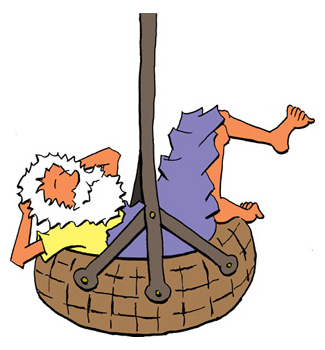
Socrates: Our First View
Our First View
The first view the world has of Socrates is of the philosopher suspended above the ground in a basket. When Strepsiades of Athens, who came to ask Socrates for help for his financial problems, asks what the heck he is doing, the philosopher breezily replies, "I am walking on the air and speculating about the sun."
For the next two hours we see Socrates as a complete charlatan who fatuously spouts off meaningless philobabble the likes of which not even the most starry-eyed freshman philosophy major would dare. After Socrates shows Strepsiades around (during which the philosopher says there are no gods, just natural phenomena), Strepsiades joins the fawning students who make up the "Thinkery". Sadly Strepsiades finds he isn't smart enough to complete his studies, so he gets his son, Pheidippides, to enroll.
But when Pheidippides returns home, he has learned how to rationalize any behavior by philosophical arguments. He explains - and demonstrates - why it's the sons who should beat their fathers and not the other way around. The enraged Strepsiades returns to the Thinkery and sets it on fire. Socrates and his students, blinded by smoke, flee into the streets, while Strepsiades shouts, "Oh, you insulted the gods! Chase them, hit them, strike them down! Go on! They completely deserved what has happened to them, because of their blasphemies!" The curtain rings down - or it would if Greek theaters had curtains.
This, of course, is the Socrates we see in the play The Clouds written by Aristophanes. First performed in 423 BCE when Socrates was 46 years old, the play is the only extended view we have of the philosopher that was written during his lifetime. Aristophanes also mentions Socrates briefly in two other plays, again as the swindling windbag of The Clouds.
The next time we hear about Socrates he had been executed by the Athenians for corrupting the youth of Athens and for impiety toward the gods. Socrates was 70 years old. Plato, Socrates' most famous student, also said the Athenians accused Socrates of making "the worse argument seem the better", and that he studied natural sciences such as geology and astronomy (literally "things above and things below"). Strange charges to our way of thinking, particularly for a capital crime.
Of course, in middle school you learn that the real Socrates was indeed Plato's wise and gentle philosopher who had decided to live a life of poverty and dedicated to teaching. Far from corrupting youth, Socrates had a most wholesome influence on them. By asking a series of probing questions - in a process called the Socratic method - he taught his students to examine their own thoughts and beliefs as much as those of others. The trial of Socrates was the first trial in history for freedom of speech and conscience.

A Wholesome Influence
But still, historians say that the earliest accounts are the most reliable, and so we can't just brush off the Socrates of the Clouds as total nonsense. But we're in a dilemma. The earliest - and so most important - picture of Socrates is also a fictionalized and satirical comedy. Imagine what future generations would think about the American Air Force of World War II if their only source material was Joseph Heller's novel Catch 22?
But what did Socrates himself think of the play? According to tradition, Socrates attended the first performance and stood up so the audience could compare the features of the actor's mask with the real thing. Certainly, Plato tells us Socrates took the play as good natured ribbing. The Greeks enjoyed their comedies much as the celebrity "roasts" of our own time. There was a play in which Pericles, the Athenian general and politician, was mercilessly trashed. The play took first prize at the Festival of Dionysus, and then the citizens went ahead an elected Pericles general again.
There is a problem, though, with the Clouds being just a nose tweaking of Athens' most famous philosopher. The play paints such a completely vindictive picture of the man that we can practically hear the cheers and applause when Socrates and his students flee the burning Thinkery. Also the charges against Socrates that were listed by Plato can be drawn - in many cases word for word - from Aristophanes' play.
Plato clearly thought that the play had confused the Athenians to the point they thought the fictional burlesque in the play was reality, much as scholars today lament that the public's idea of history comes from the creation of screen writers who can (and do) invent scenes and dialogue out of the whole cloth (not that some famous "non-fictional novelists" haven't done the same thing). But who was the real Socrates and what the heck really happened in Athens over 2400 years ago?
The Real Socrates: Not Quite What You Think

The Real Socrates: A Venture Capitalist?
Socrates was born in 469 BCE, and according to Diogenes Laertius, a Greek historian of the second century CE, he was the son of a sculptor named Sophroniscus and his wife Phaenarete. Presumably Socrates trained to follow the trade of his father and in some of Plato's writings one of the students says Socrates was a sculptor.
The topic of Socrates' family is complex and was muddied even in ancient times. The sources are scattered, often third or fourth hand, and even writings by people who actually knew him can't really be called historical or objective. But if you put the pieces together, you can understand how Socrates was able to live to the age of 70 and not do much work.
The indications are that far from being a poor laborer, Socrates' dad, Sophroniscus, was pretty well off and had connections with the high placed politicians of Athens. After all, we read that when Sophroniscus died, he was able to bequeath to his son a "modest fortune". And a modest fortune - if you live modestly - is certainly enough to get by on.
But Socrates might have also got money the same way as did some other young men - like George Washington. Ergo, he married it. We know that Socrates married a lady named Xanthippe, and her name - with the etymological connection to the Greek word for horse, ἵππος, (pronounced "HIP-pos") - indicates she came from a well-to do and perhaps even aristocratic family. So Socrates would have been able to take good advantage of the quaint Greek custom known as the dowry. In other words, when he got married, his father-in-law paid him cash to take his daughter off his hands. The better the family, the more you got. The story that Xanthippe was cantankerous and difficult could also mean that she was having difficulty in landing a husband. If that was the case, her dad would be willing to pay a bit more than usual to encourage a suitable swain.
Finally Diogenes gives us a final detail of the Finances of the Philosopher. Socrates, he says, would take his money, invest it, and then live off the interest. Then if the payouts started to get too low, he'd take the principal, invest it in something else, and start the cycle over again.
How about that? Socrates, venture capitalist.
Another tradition - known to and discussed by a number of ancient historians - was that Socrates' had a second wife named Myrto. Myrto, again according to Diogenes, was related to the famous (and rich) Athenian statesman, Aristides the Just. So Myrto may have had a hefty dowry as well.
Strangely, we read that Socrates, Xanthippe, and Myrto were all living together. Later historians in the nineteenth and early twentieth centuries tended to pooh-pooh this Socratic menage a trois, even though Aristotle - who may have heard the account first hand from Plato - confirmed the story in a work that, alas, is lost. Plato and Xenonphon, both who were students of Socrates and so are firsthand but not always reliable sources, don't even talk about her. The only wife that Plato or Xenophon mentions is Xanthippe.
Socrates had three sons: Lamprocles, Sophroniscus (obviously named after Socrates' dad), and Menexenus. If Socrates was married twice, who was the "issue" of who is not clear. According to one source, Lamprocles was the son of Socrates and Xanthippe and Myrto was the mother of Soproniscus and Menexenus. But no one really knows.
Did Socrates actually work as a sculptor? Possibly, and there is (again) a tradition that some of the statues found on the Acropolis were carved by him. However, it may be the attributed works were by another sculptor of the same name, and besides, if our Socrates ever did work as a sculptor it probably wasn't for long. He preferred philosophy. But that was fine. For any Athenian citizen, debate and discussions were honorable pastimes. In fact, the best citizens did no work at all. They preferred to live on the money of businesses run by slaves, by rent from land or houses, or by from investments. So if our entrepreneurial Socrates is an accurate picture, he wasn't that unusual.
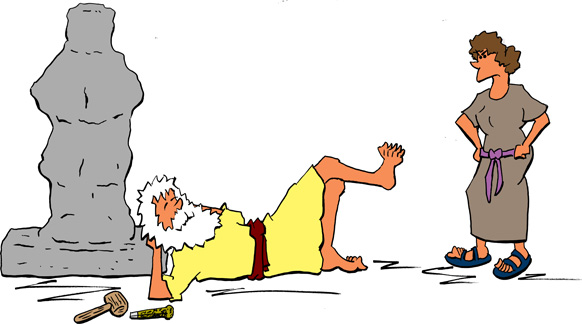
Socrates didn't work for long.
Socratic Sophistication

Athenians didn't care for the sophisticates - or rather, the sophists.
But it was his unorthodox approach to philosophy that brought attention to Soproniscus' pug-nosed, squat, and (according to the writings) incredibly ugly son. Socrates loved to argue and would accost anyone on the Acropolis, asking a bunch of wiseacre questions about what you thought and then confounding anything you said by throwing out more questions. But Socrates rarely offered any answers himself, and sometimes the people would get so ticked off at his pugnacious in-your-face arguing that they would grab him and yank his hair out. Socrates would then laugh off the episodes and go on arguing. But here we begin to see a Socrates tending to look a bit more like the character of the Clouds rather than Plato's dialogues.
So what did the average Greek think of Socrates? First, his fellow Athenians said Socrates was the type of teacher called a sophist. Generally speaking, a sophist was no more (and no less) than an expert on various topics. Giving us the words sophisticate and sophisticated, the sophists would specialized in a given subject, and they didn't just restrict themselves to philosophy. You had sophists who taught math, science, and even the martial arts. By Socrates' time, sophists were professional educators who were paid for their teaching, and the most successful were those who taught rhetoric, debate, and public speaking.
However, the Greeks saw the sophists as a bit, well, if not completely disreputable, then a bit conniving. A good sophist could take any side of an argument and make the case ("making the good seem the worst") much as today's law students are arbitrarily assigned to argue a case no matter what a scumbag the client was. The average citizen of Athens could get as irritated with sophists just as people do with our lawyers today. You even wonder if the Greeks had sophist jokes ("You know, Leonnatos, it's that 99 % of the sophists that give the rest a bad name.")
But modern writers universally disavow Socrates was a sophist. They point out he did not take money for his teaching nor did he claim expertise in any field. On the contrary, he was surprised when he learned that the oracle at Delhi said Socrates was the wisest man in Athens. The wisest man in Athens? Shoot, he, Socrates, didn't know anything. Then he figured maybe that's why he was wise. At least he knew he knew nothing.
For himself, Socrates flatly denied he was a sophist and cited the same reasons as modern historians (or actually the modern historians are using Socrates' reasons). But ironically the fact that Socrates had to explain in detail why he wasn't a sophist confirms that the majority of Athenians thought that he was. Fifty years after Socrates died, the Greek orator, Aeschines, made a passing comment about "Socrates the sophist" in a manner that assumed everyone took the notion for granted.
How could the Greeks say a man was a sophist and took money for his teaching when he clearly did not? Well, whether Socrates accepted payment boils down to definitions. Although Diogenes says that Socrates never asked for a fee, that doesn't mean he wouldn't accept gifts in the manner of the famous television evangelist who told his viewers he would send them an record album "absolutely free" in return for a $25 donation. And of course, Socrates would have received near constant invitations to dinner or parties - the symposia - put on by his many wealthy students. In our day we can rationalize Socrates was not receiving fees for his teaching. But to the average Athenian - who despite state coinage did much business by barter - it sure looked like Socrates was getting paid.
But as his main defense against being a sophist, Socrates claimed he didn't teach anything at all. His method of just asking questions could not be teaching. Instead, what he did was to help the students examine their own ideas and beliefs and so become their own teachers. The best example of the Socratic method is shown in Plato's most famous book, the Republic. Sadly, though, that is not the best book to prove Socrates didn't teach anything.
Today the Republic reads laughably naive - although you can cherry-pick bits and pieces to make it seem like the book foreshadows modern ideas of freedom, equality of gender, and abolition of slavery. Mixed in with apparently progressive ideas is the argument for a society practicing promiscuous eugenics of the upper classes and having lower class children killed or sent away. But more importantly, the Socrates of the Republic is less a wise sage showing people how to think for themselves than a pushy politician who through a series of specious arguments force feeds his own views into the gullets of credulous students who can hardly get a word in edgewise.
Socrates: But is the art of medicine or any other art faulty or
deficient in any quality in the same way that the eye may be deficient
in sight or the ear fail of hearing, and therefore requires another art
to provide for the interests of seeing and hearing? Has art in itself, I
say, any similar liability to fault or defect, and does every art
require another supplementary art to provide for its interests, and that
another and another without end? Or have the arts to look only after
their own interests? Or have they no need either of themselves or of
another, having no faults or defects, they have no need to correct them,
either by the exercise of their own art or of any other; they have only
to consider the interest of their subject matter? For every art remains
pure and faultless while remaining true, that is to say, while perfect
and unimpaired. Take the words in your precise sense, and tell me
whether I am not right.
Thrasymachus:
The basis of the Republic is that the most "just" society is an aristocracy with an elite class ruling over the masses who aren't smart enough to govern themselves. So the Republic was very popular with kings and queens into the late 19th century who believed that the most just society was, well, an aristocracy with an elite class ruling over the masses who aren't smart enough to govern themselves. In Plato's time, though, the Republic was easily seen as a thinly disguised idealized Sparta where philosophers - that is, people like Plato - would be the kings. These were most undemocratic and un-Athenian sentiments, indeed.
To the Athenians, then, Socrates looked like, walked like, and quacked like a sophist. What else could they conclude other than he was a sophist, and one who quacked out strong anti-democratic sentiments?
That Old Time Impiety

Impiety means you didn't participate.
One of the most difficult questions to resolve is what exactly were Socrates's religious views. Plato certainly shows us a Socrates who was not only religious but surprisingly modern in his beliefs. He not only spoke with reverence of divine power, but even used the word "God" in the singular, ὁ θεός (pronounced "ha theh-AHS") and not the plural "gods", οἱ θεοί ("hoi theh-OY").
Among the charges against Socrates was "impiety". Specifically, he was accused of denying the existence of the official gods (ergo, the "real" ones) and - worse - inventing his own. In the Clouds, Socrates does in fact deny the existence of Zeus (an official god) and says that the clouds are the only real goddesses.
But why was that such a big deal in a society that largely permitted people to worship any gods they wanted to? Also the Greeks themselves seem hardly pious since in their myths they often pictured the gods acting like a bunch of churlish buffoons. Aristophanes even wrote of how one of his characters thought rain was Zeus "pissing through a sieve", yet the playwright was never called to task.
Impiety, then as now, is a rather ill-defined concept and was never really specified by law. On the other hand, one peculiarity of Athenian law - and ancient law in general - is that specific acts in themselves were not necessarily crimes unless they caused a problem. This is a bit troubling to us who like to think that laws are clearly written so you know what is and isn't illegal.
But in fact we do have you-don't-know-you're-breaking-them-until-later laws like Athens. For instance, all of the US states have a "basic speed law" which states that regardless of posted speed limits, you cannot drive faster than what is safe and reasonable given the conditions. Here "safe and reasonable" is not defined. Even if you are driving well under the posted speed limit, a policeman can - and this is true - pull you over and give you a ticket if he thinks you were driving too fast "for the conditions". This law is most invoked after an accident - that is, your driving is safe and reasonable unless it causes a problem.
So Athens had what we can think of as a "basic impiety law". As long as you didn't cause problems with your jokes about the gods, it didn't matter. If you insisted on making fun about Zeus and Ganymede (Zeus's "cup-bearer" - wink-wink), you need to make it clear that you're just joking and are really a good patriotic Athenian.
So how do you show your piety? Well, the best way was to participate in the state religious functions. If you attended the various festivals and sacrifices, the gods were pleased regardless of what you said at other times. But if you didn't attend, then the gods knew you didn't respect them. So they would get angry and call down all sorts of calamities. If Athens lost a battle, suffered a plague, or had an earthquake, then the gods were angry, and it was all because you had stayed at home. Ergo, you were "impious".
Did Socrates go to the festivals and sacrifices? Evidently he did. Both Plato and Xenophon take pains to point out that Socrates attended the state sacrifices and performed proper religious rituals in his home. Xenonphon said he couldn't see how anyone who knew Socrates could say he was impious.
As long as you participated in the religious rituals, then, individual belief was not that important. You could even deny the gods existed, and although you might irritate certain people, as long as you weren't causing anyone any real trouble, you would be left alone. Around 600 BCE, one of the earliest philosophers, Thales of Miletus (Miletus was on the west coast of modern Turkey), began proposing that natural random phenomenon like earthquakes, eclipses, and storms were simply, well, natural random phenomenon. Citing divine action to explain things like earthquakes, eclipses, and storms were not only unnecessary, he felt, but simply out and out wrong.
There is good evidence that Socrates taught, or at least was sympathetic to, the all-natural-but-no-gods approach. In the Apology of Socrates by Plato, that is, the απολογία (pronounced "ah-pahl-oh-GEE-ah") or verbal defense, the elder philosopher admitted he studied science in younger early days. Again, this is hard to think of as a capital crime by most people today, but it implies he subscribed to the philosophy that the world was governed solely by natural non-divine forces. This again fits in with the Socrates of Aristophanes who dismissed Zeus as non-existent and explained rain and thunder came from clouds bumping and rolling into each other.
Finally Socrates was, we must admit, a bit weird. He had a rather strange habit of just sitting around the public areas and staring off into space. Sometimes he'd stay like that all day. Socrates explained this behavior as listening to his own internal voices. He and his students saw this as no big deal. This was just Socrates communicating with his personal δαιμόνιον (not to be confused with the later English derivation). But the Athenians saw this as saying he listened to some new gods. The more scientifically minded of later ages would probably check "None of the above" and say Socrates suffered from catatonia, or today, temporal lobe epilepsy.
But we're not asking how Socrates' saw himself or how his students saw him, but rather what the average citizen thought. Socrates? Why, he's just that guy who wanders around town followed by those lazy rich-kid lagabouts, buttonholing people with stupid questions, saying there are no gods, and then just zonks out and sits around staring into space.
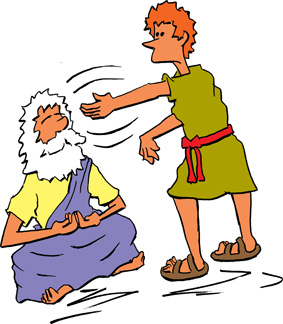
Socrates would sometimes zonk out.
In the end, we have to conclude that Mr. Joe Average Athenian saw Socrates much more like the strange charlatanistic swindler of the Clouds and not the wise and gentle philosopher of Plato. But if that's the case, why did the Athenians wait a quarter of a century after the Clouds was performed before prosecuting him?
At this point we need to return to the notion of ancient law in general and Athenian law in particular. Athenian laws, as we pointed out, were quite flexible, indeed, a bit more flexible than made enforcement convenient. If something was worth prosecuting, it had to be causing a problem.
But for most of Socrates' life it was difficult to point to any real problems that he caused. Sure, the rich kids hung around him and didn't do anything to earn a living. But they wouldn't have done anything anyway. He was a pain in the rear end, true, but so were a lot of other people. Besides Socrates had always fulfilled his duties as a citizen. He served on juries, held office (drawn by lot), and served in the military. Just being a fractious, obnoxious oddball who surrounded himself by immature and privileged profligates was not in itself a crime.
But then came that pesky interlude in Greek history known as the Peloponnesian War.
Athens vs. Sparta - The Delian vs. the Peloponnese
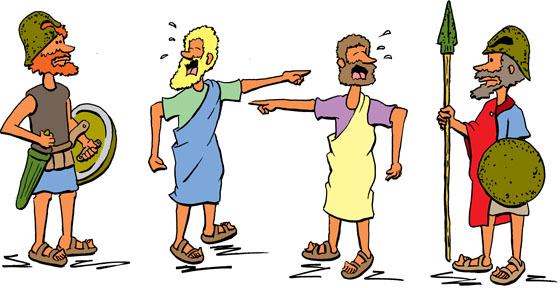
The Corchyrams and Epidamnosans asked for help.
The reasons why Sparta and Athens went to war in 431 BCE are only slightly less complex than why the countries of Europe began to fight in August 1914. But briefly, you had various alignments of the Greek city states, each with treaty obligations to come to the aid of the other. When some cities asked for help from others, you usually had problems.
There were two major groups of cities in Greece. One group was centered around the Aegean Sea and also included towns that were on the west coast of modern Turkey. These cities made up the Athenian Empire or to give it a more high-falootin' name, the Delian League.
We call the Athenian Empire the Delian League because the league was named after the island of Delos. Delos is sort of in the center of the Aegean Sea and so was a convenient place to hold meetings. It was also a major religious center with the principle temple to Apollo located on the island. But if Athens thought that meeting in this central location would make the other cities think they were all part of one big happy family, they were mistaken. A lot of the cities didn't like being in the Delian League, mainly because they had been forced to become members.
That the Delian League was composed of coastal cities made sense since Athens' true forte was in naval warfare. The deal was that the member states had to either supply Athens with a given number of warships - called triemes - and a crew, or they had to pay enough tribute so Athens could build and man the ships themselves. Since many cities were too small to go to the trouble of establishing shipyards, and so they preferred to pay the cash. The negative side of the deal was that the cities were also paying Athens to build ships which could be sent against fellow Delians if Athens saw fit.
On the other hand, if a Greek city wasn't on the Aegean Sea, then it was probably a member of the Spartan Alliance, called the Peloponnesian League. Sparta was an inland city and so they fought best on land. So there was no real reason for Sparta and Athens ever to go to war.
Unfortunately, if you were in the Delian League and you had trouble with another city, you would go ask for help from Athens. But if the inhabitants of a city in the Peloponnesian League had problems, they would turn to Sparta. So if two "minor" cities in the two leagues had problems with each other, they could drag Athens and Sparta into the fight.
Similarly if Athens was having problems with a smaller city of the Peloponnesian League, the smaller city would complain to Sparta. If Sparta got into a scrap with a member of the Delian League, the Delian city could go to Athens for help. In actual practice things could be a bit more complicated, and some cities were independent and part of neither league. But even then, the cities would have "ties" either to Athens or Sparta. So there was always pretty much an Athens/Sparta dichotomy in Greek politics.
There were three separate incidents which led to the Peloponnesian War. As you might guess by now, none of them directly involved both Athens and Sparta, and none were very important in themselves. And far from having the Spartans appear as the bad guys (as they usually are pictured), it's the Athenians who come off looking like jerks.
The first incident was between two cities most people have never heard of, Corcyra and Epidamnos. Corcyra was on the northwest coast of Greece (and as the modern city of Corfu, still is). A group from Corcyra later moved further north and founded Epidamnos which today isn't even in Greece, but is the city of Durrës in Albania. Corcyra on the other hand had originally been settled by Corinth, so all three towns were part of the Peloponnesian League.
There were two rival groups in Epidamnos, the Democrats and the Oligarchs. Democrats believed in an Athenian style democracy where each citizen should be involved directly in running the government, should hold office drawn by lot, and serve on juries. The Oligarchs, on the other hand, believed in a representative government where a smaller group would (at least in principle) speak for the rest. But oligarchs tended to represent certain people - usually themselves - more than others.
The relations between the two groups in Epidamnos began to get testy, and around 435 a civil war broke out. The Democrats won the first battles and booted the Oligarchs out of the town. Then the Oligarchs made an alliance with some non-Greek (ergo, "barbarian") neighbors and returned to lay siege to their town.
Both groups appealed to Corcyra for help. But democracy was considered a bit revolutionary in the Peloponnesian League, and Corcyra sided with the Oligarchs. Miffed, the Democrats then went up the ladder and asked for help from Corinth. For some reason, the Corinthians - no fans of democracy - agreed to help and sent ships to fight the Oligarchs. But the resulting battle ended up with a victory for Corcyra and the Oligarchs.
Although Corchyra won the battle, they were irritated that Corinth - their "mother city" - had sided with the democratic group of Epidamnos. You would expect they would complain to Sparta, the head of the Peloponnesian League. Nope. They went to Athens and proposed a mutual defense treaty. Athens hemmed and hawed a bit, but finally agreed to help Corchyra if they were ever attacked. They even dispatched some ships to be on hand just in case more fighting erupted.
Perhaps Corchyra was not exactly a full-fledged member of the Delian League but the agreement just made was too close to it for Corinthian comfort. Until then the Delian League had been limited to cities surrounding or islands in the Aegean. Now Corinth found that there might be Athenian "influence" on the west coast which would interfere with the Corinthian trade routes in the Adriatic and Mediterranean Seas.
Corinth decided to teach Corcyra not to be too pally with Athens and sent some ships up the coast. The Corcyrans were losing the battle but then the Athenian ships showed up and forced the battle to a draw. The Corinthians sailed way, and this rather minor Corcyra-Epidamnos war came to an end leaving Athens an ally to Corcyra.
Next, there was a problem with the town of Potidaea, which is up at the northwest curve of the Aegean sea. Potidaea, like Corcyra, had originally been settled by Corinth, but had been more or less forced to join the Delian League as part of the Treaty of 446 that ended the Persian Wars. However, in year 432, Athens decided the raise the amount of tribute Potidaea had to pay and they told Potidaea to stop dealing with Corinth and they said Potidaea also had to tear down part of its defensive walls.
Potidaea didn't like the new terms so they complained to Corinth. Corinth, feeling themselves a bit stretched from the previous war with Corchyra asked for help from Sparta. But they didn't ask nicely. They said that if the Spartans didn't help them in their aid to Potidaea, Corinth would leave the Peloponnesian League. So there.
Well, Sparta did send a contingent to help, but to show they didn't care for Corinth's bad attitude, they made sure that the soldiers were mostly Corinthians who happened to be stationed in Sparta. The Corinthian/Spartan army marched into Potidaea, and Athens promptly set up a siege. That's the way things were in the year 432.
It was the same year that Athens, again flexing its muscle as the head of the Delian League, told the city of Megara, which was actually part of the Peloponnesian League, that they could no longer use the port of Athens and send their goods to the Athenian marketplace. That is, unless, said the Athenians with a smile, you leave the Peloponnesian League and join the Delians. But Megara pointed that the Treaty of 446 said they were allied with Sparta. Tough bananas, said Athens, join the Delian League, pay us tribute, or you can't use our port.
At this point, if we believe Thucydides, the Athenian general and historian who wrote an eye-witness account of the Peloponnesian War, the Corinthians began to trash, not Athens, but Sparta. When the problems with Corcyra and Epidamnos and now with Potidaea began, said the Corinthians, the Spartans had not taken a strong enough stance against the Athenians. Because of Spartan indifference and its lukewarm support of its allies, they have allowed Athenian power to dominate Greece. So you better get off your duff and take some real action.
Sparta, seeing they were losing support of their own allies, told Athens they had to abide by the treaty which meant hands off Megara. But Athens wasn't interested in having the Spartan bumpkins dictate what they did, and said Megara had to join the Delian League if they wanted to use the Athenian port. The Peloponnesian League then voted to go to war against Athens. The Pelopponesian War was on, and two of the soldiers fighting for Athens was a 37 year old Socrates and a most promising young politician named Alcibiades.
Alcibiades Steps In

The Hermes: Other Uses
The story of Alcibiades (pronounced in English as "al-sih-BYE-uh-deez" although in Greek it's "al-kih-bee-AH-days" for Άλκιβιάδης) is a rather complex one. In many ways he was the quintessential Athenian: handsome, well-educated, and athletic. He had even been a champion of the Olympic games, winning the first prize in the chariot races. Of course, taking the prize simply meant he owned the horses. The actual driver was probably a slave, but that didn't matter. To the Greeks Alcibiades was an Olympic champion.
Alcibiades' celebrity was somewhat counteracted by a reputation as a party-animal. He wore stylish clothes, sported a bit of a sissified coiffure, and hung around with rather foppish friends. Still after the great Pericles died of the plague that hit Athens around 429 (which may have been typhoid fever), if anyone was on the rise in Athenian politics it was Alcibiades.
Alcibiades was elected to be a general. He decided that to defeat Sparta, Athens had to stick with using its navy. They would draw Spartan forces into naval battles - which Athens did best - by attacking Spartan colonies away from the Greek mainland. So he suggested the Athenians attack Syracuse, the Spartan ally on the island of Sicily. A victory here would not only wrap up the war, but also bring the Athenian generals honor and even more wealth.
The Athenian ἐκκλησία (pronounced "ehk-clay-SEE-uh"), that is, the Assembly of all free Athenian citizens eligible to vote (ergo, men) agreed. But before Alcibiades set off he was implicated in a major scandal. No, unlike modern politicians he didn't get caught with his pants down (or rather his robe up). Instead, one night a large number of sacred statues, called the Herms, had been vandalized. These were rather blocky statues which had the face of the God Hermes carved at the top of a square pillar and on the front was a carving of, well, what the Romans referred to as the "parts that are held in reverence" standing tall and proud. The Herms were found all over the city and were supposed to offer protection, although they may have had other uses as well.
Vandalism of statues and public buildings sometimes happened after a late night symposium where the more immature and irreverent guests would reel out in the streets on the way home. With the reputation Alcibiades and his buddies had for being impious and partying hell-raisers, some Athenians suspected he was behind the vandalism.
But things got worse. Acidbiades and his friends were then accused of having "profaned" the Eleusinian Mysteries, a set of rites that had to be performed only by a select group of worshipers at a specific location. We don't know exactly what the profanations were. Alcibiades and his buddies may have re-enacted, possibly in mocking manner, the rituals in an unapproved location - kind of like some wise-arsed tanked up college boys going to the local pub and acting out Holy Communion with some beer and pretzels.
These were serious charges, so serious that as soon as Alcibiades got to Sicily he received a message recalling him back to Athens for trial. The prosecutors had developed a strong case since witnesses had stepped forward to give direct testimony. Remember, there was a war on and such impiety angered the gods who would then direct their favor toward the Spartans. So even before Alcibiades got back home, the Assembly had convened a court, and on the way home, Alcibiades learned he had already been found guilty and condemned to death in absentia. A speedy trial is fine, thought Alcibiades, but this was ridiculous. So he diverted his path to the Peloponnese and took refuge in Sparta.
Then while he was in Sparta, Alcibiades learned that there was no longer a democracy in Athens. In 411, as so often happens in times of - quote - "national emergencies" - unquote - the normal government had been replaced by more streamlined functionaries. Athens was now an oligarchy and ruled by a group of 400 aristocrats. All government decisions were made by the oligarchs, and so only a few of the citizens had any voice in the government. The oligarchs even took over initiating prosecutions and deciding guilt of the accused.
By their very nature, the oligarchs in Greece tended to be rich fat-cats - just Alcibiades' kind of people. So he hoped that the new Athenian government would nullify his conviction. That would mean, aside from the obvious advantage of not being executed, he could get his money and property back (there was some talk that he had even been involved in getting the oligarchy in power). However, the oligarchy was quickly thrown out by a pro-democratic faction. Then to everyone's surprise, the democratic government invited Alcibiades to return to Athens.
The Real Athenians: Democratic/Oligarchic Flip Flops
Sometimes you'll read in the brief histories of Greece (particularly as found on the Fount of All Knowledge) that the democratic governments in Athens would be occasionally "replaced" by an oligarchy. Then the democracy would be "restored" only to be replaced by another oligarchy which in turn would be followed by yet another democratic government.
But how was this possible? More specifically, just how could perhaps 50,000 free Athenian citizens (remember only adult males could vote and serve in office) lose their power and allow a small group of the richest citizens run a city famous as the birthplace of democracy?
Although details vary, the general procedure goes like this. Greek democracy did not always operate smoothly. The Assembly - where any citizen could speak - was not a group of nice polite gentlemen each speaking in turn and calling each other "My learned friend". Instead the meeting often degenerated - as one historian said - into something like the more fractious parliaments we have today and the Gong Show. Sometimes deliberations would be done under incredible disorder and speakers would be shouted down and even pulled from the platform. Now if times were good, disorder in the Assembly wasn't a problem. Life hummed along and who cares if the politicians wasted their time making speeches no one listened to?
But if times got bad - such as during the Peloponnesian War - you had to get some real work done. So during one of the Assemblies, one of the louder citizens would get up and say, hey, enough of this blather. Let's set up a council of - instead of all free adult males - a smaller group - say 1500 or 400 or 30 men - and let them make the decisions. We don't even need to elect the council. We'll just pick a few guys, and they can appoint the others. That way the council will be composed of people who can get along.
On the surface, this wasn't a lot different than the way the Athenians really did business. There was always a council of 500 people, ἡ βουλὴ οἱ πεντακόσιοι (pronounced "hey boo-LAY hoy pen-ta-KAH-see-oy" and translated as - what else - The Council of the Five Hundred), which would make day to day decisions. However, they as individuals had limited power and spent most of their time scheduling who spoke and when votes were taken.
So in the time of trouble, the Athenians could rationalize that setting up an oligarchy was nothing more than expanding the powers of the βουλὴ. And when we say expanding powers we mean expanding. Members of the βουλὴ now had complete power not only to make laws and convene the courts, but also to serve as the judges and juries.
The idea was that the oligarchs would be restrained in their actions and work for the good of the country. Sadly, the Athenian politicians could no more separate the good of the country from their own personal or party interests any more than ours can today. So once the oligarchs were in power, the first agenda item was to prosecute their political enemies. The trials would be carried out in secrecy, and conviction was assured. The big bonus - for the oligarchs - was that anyone convicted would - among other things - lose their land and money to the state, ergo, the oligarchs.
Well, once the Athenians who weren't on the committee saw their friends arrested, exiled, and executed, they thought maybe an oligarchy wasn't such a great idea after all. There was, then, only one way to avoid being arrested on some ex-post-facto charge. You simply moved to another town, presumably one which had a democracy like Athens.
Eventually enough people would move out of Athens, that you now would have two groups - the oligarchs in Athens and the democrats in exile - both claiming to be the legitimate government of Athens. When there was enough of the pro-democracy advocates to form an army, they would march on Athens. The oligarchs would then send an army to meet them, and the battle would be joined. If the oligarchy lost, democracy would be restored - at least until there was another crises.
Although Alcibiades had been invited back to Athens, he didn't return right away. But evidently he put up some money to finance the war for Athens and eventually he did return and took over the running the war.
It turned out that the attack on Sicily - which went forward even without Alcibiades - had been at best inconclusive. During the war, the Spartans themselves had learned to fight at sea, and after driving the Athenians back home, had now invaded the Aegean. They had even moved their ships north and were blocking the Hellespont. This is the strait at the north end of the Aegean Sea that leads to the Sea of Marmara and into the Bosphorus Strait and the Black Sea. This route was a major source for Athens to import grain, which the Athenians needed since each year the Spartans had been burning their crops.
Once Athens again became a democracy, the Assembly voted to attack the Spartans right in the Hellespont. It was not a great place to fight a naval battle, and the Spartans were strong. Alcibiades warned against this strategy, but his advice was ignored. Still Alcibiades had to do what the Assembly wanted.
For a while the fighting went back and forth and eventually Athens recovered Byzantium (modern Instanbul). But Athens found they were no longer the kings of the sea, and in 405 the Athenians attacked the Spartans at Aegospotami (about halfway up the strait) and were defeated. This brought an end to the active fighting, and the next year, Athens formally surrendered. So after twenty-seven years of the Peloponnesian War - with a few pauses for the Olympic Games and the occasional truce - Athens lost. Yes, Athens lost. This was kind of like - as one commentator pointed out - the Galactic Federation being defeated by the Klingons.
And Alcibiades? Well, he escaped to Phrygia in Turkey and was killed by the local governor.
The Last Days of Socrates

Alcibiades had the interest.
After the war, Alcibiades was not thought of very well by the Athenians. Rather than being the astute general who was recalled to duty, he was one of the ineffectual politicians who lost the war. The Athenians also remembered him as the man who had defected to Sparta and had been convicted of vandalizing the Hermes and profaning the Elusian Mysteries. When you got down to it, Alcibiades had been nothing more than a drunken, impious rich kid who used his money to buy his way into power.
But then what could you expect? Alcibiades had been a student of Socrates.
Strike one.
In fact according to Plato dialogues, Alcibiades and Socrates were a bit more than just student and teacher. At the opening of Plato's dialogue, the Protagoras, the unnamed speaker says he hasn't seen Socrates around, but of course he knew that Socrates has been chasing the good-looking and bearded Alcibiades. And if Plato's Symposium is to believed, it was Alcibiades who had the most interest in the relationship, even when the older man did not encourage actual physical intimacy.
For now, though, Sparta was in charge, and they dictated that an oligarchy must take over of the Athenian government. This particular oligarchy was quite exclusive and was controlled by only thirty men. One of the first acts of these thirty oligarchs - commonsensically called "The Thirty" - was to summarily execute 1500 pro-democracy citizens. The leader of the Thirty was a politician named Critias, a man who had long opposed democracy and was fervently pro-Spartan.
Socrates, we should note, opposed the actions of the Thirty. Critias had summoned five men, including Socrates, and ordered them to arrest a leading citizen named Leon of Salamis. The purpose of the arrest, as usual, was to seize Leon's money and property and put it in the hands of the oligarchs. Socrates refused any part of the plan and went home. But note he didn't bother to warn Leon.
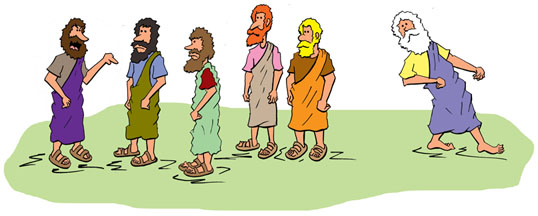
Socrates just went home.
Critias and his friends didn't last very long. Critias was killed in battle with the pro-democratic forces in 402. Democracy was restored.
But there was yet another problem.
Critias had been a student of Socrates
Strike two.
By now the Athenians were seeing a connection with the anti-democracy take-overs, mass murder of political opponents, and pro-Spartan sympathies with the teachings of Socrates. Athenians began to think of Socrates less as a pompous, charlatanistic windbag and a figure for comic derisions than as a sinister figure who took a leading, if behind-the-scenes role, in the fall of Athens. It was almost as if Socrates had spent his long life teaching politicians to bring on the defeat of Athens and kill its leading citizens. So by 402, Socrates was not a popular man in Athens, although nothing was done against him officially.
Then in 401, there was yet another attempt to replace the democracy by one more group of anti-democratic oligarchs. The attempt failed and yes, it had been led by yet one more group of pro-Spartan - and pro-Socrates - whippersnappers.
Strike three.
Socrates was out.
Strictly speaking, the "Athenians" did not charge Socrates. Instead the prosecution was initiated by three private individuals: Meletus, Anytus, and Lycon. There were no lawyers or prosecutors in our sense of the words, and any citizen could initiate a court case against another. The procedure was for the prosecutor to go up to the person he wanted to prosecute and inform him of the proposed charges. Next he would inform a judge of his intent to prosecute. The judge would then investigate the case to make sure the charges had merit. If the prosecutor was given approval to continue, the court case would be scheduled and everyone told to show up.
Athens had no real executive branch, and there were no enforcement departments to make sure anyone charged with a crime would appear. So you could skip town easy enough. But this was rare. The social pressures were great enough to ensure compliance with the subpoenas - not to mention you'd lose all your property if you didn't.
Trials were limited by law to be no longer than one day, and so the arguments were timed by a waterclock. The prosecution would present its case, followed by the defendants. Then the jury would vote.
The jurors were drawn by lot from a pool of 6000 Athenian male citizens and they were paid a modest fee. In - quote - "minor trials" - unquote - there were 501 jurors and for more serious crimes the juries could be 1001 or 1501 jurors. Socrates' trial, strange as it seems, was a minor trial and so there would have been only 501 jurors although most accounts said it was 500.
When the jurors came to court they were handed two "ballots" which were small disks of bronze with a stem through the middle. On one ballot the stem was hollow - which stood for a "guilty" verdict - and the other ballot - "not guilty" - had a solid stem. When it came time to vote, the juror would place their vote in a vase and then discard the unused ballot in another. As he voted (yes, only men could serve on juries), the juror would hold the ballot to hide whether the stem was hollow or solid. So his vote would be kept secret.
If the verdict was guilty, then the jurors would decide on the sentence. One big difference between our legal system and theirs was they did not sentence people to jail. To exile, yes. To pay a fine, certainly. To death, sometimes. But sending people to jail for years was crazy. It just cost too much.
The charges against Socrates were 1) he made the worse argument seem the better (that is, he was a sophist), 2) he studied things above and things below (he studied science), 3) he was guilty of impiety, and 4) he corrupted the young. Although in principle the charge of impiety may have been the most serious, in practical terms, it was the charge of corrupting the young - in particularly Critias - that he was really being charged with.
In fact, there's really not much doubt that the real "crime" of Socrates was he had been the teacher of Critias, and that the Athenians knew that was the real reason. Half a century after Socrates was dead, an Athenian statesman stated flat out that Socrates was brought to trial specifically because he taught Critias. He didn't mention anything about impiety, teaching rhetoric, or studying science.
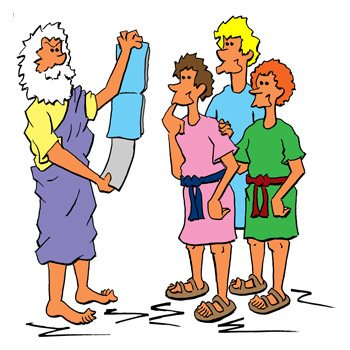
Did Socrates corrupt the youth?
We still have to ask how is it possible that teaching Critias itself could be a crime? This seems simply like guilt by association since Socrates had actively opposed - at the peril of his own life - the Thirty in general and Critias in particular.
We saw earlier how Athenian law sometimes didn't define their crimes very well, and crimes weren't necessarily crimes unless they caused problems. But you could also put together individual actions, none of which were crimes in themselves, and come up with a crime. This is not something unique to ancient legal systems, and we have had similar occurrences, particularly in times of national emergencies.
In 1863. Democratic Ohio congressman, Clement Vallandigham, had given speeches in his home state which were bitter denouncements of Abraham Lincoln going to war against the south. "King Lincoln", Clement called the president, saying Abe was a dictator waging an unnecessary war. General Ambrose Burnside, who was in charge of the military in Ohio, arrested Clement on May 5, 1863 and imprisoned him. The arrest was not for violating any law, but instead Clement's speech was contrary to a "proclamation" issued by Burnside which forbade criticizing the war.

Clement and Ambrose
The arrest raised a hue and cry even in the North. How could a democracy arrest a respected citizen - a Congressman, no less - when all he did was disagree with the President and irritate a general - and not a very good general at that.
But things got worse. The "crime" occurred in a region far from the combat area, and yet, Clement was tried and convicted by a military tribunal. So we have a civilian, arrested, not for breaking a law, but acting contrary to a "proclamation", and tried by a military court, in a district not under martial law and where civilian courts were fully functional. He was sentenced to imprisonment for the duration of the war.
Attempts to free Clement with a writ of habeas corpus were not successful. Why? Well, because this crucial constitutional right had been suspended by the president and confirmed by the Congress!
Lincoln would probably not have arrested Clement on his own, and he had learned of Burnside's actions after the fact. But he refused to countermand the actions of his general and wrote a letter to a group of citizens in New York who had protested Clement's arrest. Lincoln pointed out that the Constitution does indeed permit the suspension of habeas corpus since in Article 1, Section 9, clause 2, it states that "The privilege of the writ of habeas corpus shall not be suspended, unless when in cases of rebellion or invasion the public safety may require it."
The current circumstances of the Civil War, Lincoln pointed out, were indeed a case of rebellion (the secession of the southern states) and invasion (with battles in Maryland and Pennsylvania). Clement had not been arrested for disagreeing with the president, but for his actions. He had to defer to Burnside's opinion that the inflammatory speeches were demoralizing the soldiers and encouraging desertions (quite a problem in both the North and the South). Therefore to use modern legalese, the delivery of the speeches was not protected speech, but "conduct" that was dangerous to public safety. "Must I shoot a simple-minded soldier boy who deserts," Lincoln asked, "while I must not touch a hair of a wily agitator who induces him to desert?" He denied that the wartime practices - suspension of habeas corpus and use of military tribunals would - continue in peacetime, and he hoped that soon circumstances would permit Clement to be released.
So Americans have indeed cases where guilt is defined by a collection of actions in special circumstances rather than violation of specific legislation passed by elected state or federal officials. Fortunately, the only thing we would have to worry about today would be if somehow legislation could get passed that would define a national emergency as a never ending rebellion or invasion which would permit American citizens to be tried by military courts and held without charges on an open ended basis and which could then be directed toward domestic groups who disagreed with whatever administration was in power. Of course, we know nothing like that could happen.
Of course.
And Clement? Well, rather than forcing him to spend the rest of the war in prison, Lincoln ordered him exiled to the South. Clement then took a Confederate ship to Canada where he was nominated for governor of Ohio in absentia. However, he lost the election and with a Confederate representative discussed overthrowing the governments of the northwest states (including Ohio). This plan came to nought, and he snuck back into the US in 1864. Lincoln knew Clement had returned, but decided to do nothing as long as Clement behaved himself. Clement was then slated for George McClellan's Secretary of War in the election of 1864, but George, of course, lost the election.
Clement returned to the practice of law after the war and was even bounced from the Democratic party for what were now seen as extremist views. Then on June 17, 1871, he was getting ready to defend a man accused of murder. He wanted to prove it was a case of suicide and was re-enacting what had supposedly happened using a - quote - "unloaded" - unquote - pistol. He pointed the gun at his own head and pulled the trigger. Yes, the unloaded gun was loaded as so many of them are. Clement dropped to the floor and died the next day.
But at least Clement's client was acquitted.
Socrates did not fare so well. He was convicted by the narrow margin of 30 votes. You naturally worry about whether another jury may have acquitted him. Well, that's hard to say but Socrates probably could have saved himself. The procedure after a capital verdict was to ask the defendant to propose a lesser punishment. But instead of proposing a realistic alternative - such as exile - Socrates said he should be given free meals for life at state expense. After all, by being a "gadfly" to Athens he was doing so much good that it was owing to him. Such wiseacre remarks alienated the jury who returned the death penalty by a larger margin than convicted him.
Socrates was hauled off to jail. Although generally the executions were held the day after the trial, Socrates conviction had occurred just after an Athenian ship had set sail with gifts for the Apollo at Delos. The law dictated that executions had to be postponed until the ship got back. So Socrates stayed in jail for a month. Although he was kept in chains at night, he was allowed to receive visitors at all hours who brought him special food.
Ultimately Plato thought Socrates' fate was due to the evils of democracy which let the citizens make the decisions, write the plays they wanted, and participate in the decisions as to who was guilty and who was innocent. But by emphasizing the charges in a manner that is almost a direct quote from The Clouds, Plato made it clear to us that he felt the Athenians had suffered from the ancient version of the modern affliction, αν μπορώ να το δείτε στην τηλεόραση, πρέπει να είναι αλήθεια . But perhaps we should call it αν μπορώ να το δω στο θέατρο, πρέπει να είναι αλήθεια.
The death of Socrates is described in detail in Plato's dialogue, the Phaedo (not the Fido). Over the years, people have wondered exactly what the "hemlock" was that Socrates was given to drink. Various concoctions have been proposed in the belief that it couldn't really have been hemlock. Hemlock, we hear, does not produce the gentle death described in the Phaedo. Instead, the sufferer goes into tetanus-like convulsions, seizures, and dies a painful and terrifying death.
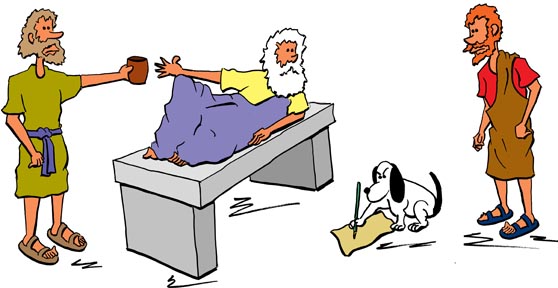
Plato's Phaedo (Not Fido)
The confusions, though, are probably because there are a number of varieties of hemlock, or because people who supposedly were poisoned by the plant were really poisoned by something else. But more recent research (and descriptions by people who have been sickened by a non-lethal dose of genuine hemlock) have shown that the creeping paralysis and the heavy feeling in the legs and arms is indeed the effects of the hemlock variety, Conium maculatum, possibly mixed with opium.
References
The Trial of Socrates, I. F. Stone, Little , Brown, 1988.
Why Socrates Died: Dispelling the Myths, Robin Waterfield, Norton, 2009
"The Historical Socrates", Robin Waterfield, History Today, 59:1, 2008
An Independent Study Guide to Reading Greek, Joint Association of Classical Teachers. A useful reference for sorting out what Aristophanes means when he uses certain words. For instance, the word σροντισηριον, the name for the school that Socrates organized, is often rendered as the "Thinkery". The word was actually coined by Aristophanes just for his play and combines the word "to think, consider" with the Greek ending of the words for "bakery" and "brewery". So "Thinkery" is about as good a translation as possible and keeps with the sneer intended by Aristophanes.
Wicked Plants: The Weed That Killed Abraham Lincoln's Mother and other Botanical Atrocities, Amy Stewart, Algonquin Books, 2009
A Treasury of Foolishly Forgotten Americans: Pirates, Skinflints, Patriots, and Other Colorful Characters Stuck in the Footnotes of History, Michael Farquhar, Penguin, 2008
"The President on Arbitrary Arrests; President Lincoln in Reply to the Albany Democratic Resolutions. Able and Interesting Discussion of the Case of Vallandigham. Letter of the Albany Committee to the President. Mr. Lincoln's Reply", New York Times, May 19, 1863.
Online Resources
The Clouds, Aristophanes, http://classics.mit.edu/Aristophanes/clouds.html
"Hemlock Poisoning and the Death of Socrates: Did Plato Tell the Truth?", Journal of the International Plato Society, Enid Block, http://www3.nd.edu/~plato/bloch.htm
Stanford Encyclopedia of Philosophy, http://plato.stanford.edu/. Articles are available on Socrates, Plato, and the Sophists.
Demos: Classical Athenian Democracy, Christopher Blackwell, Editor, http://www.stoa.org/projects/demos/home?greekEncoding=
"The Trial of Socrates", Douglas Linder, Famous Trials, http://law2.umkc.edu/faculty/projects/ftrials/socrates/socrates.HTM
"Second or Great Peloponnesian War, 431-404 BC", History of War, http://www.historyofwar.org/articles/wars_great_peloponnesian_war.html
"Clement Vallandigham", Ohio History Central, "http://www.ohiohistorycentral.org/w/Clement_Vallandigham
Other Sources
Ancient Greek Civilization, Jeremy McInerney (University of Pennsylvania), the Teaching Company, DVD Lecture Course
"Stupid Deaths: Clement Vallandingham", Horrible Histories, Series 1, Episode 2, BBC, 2009